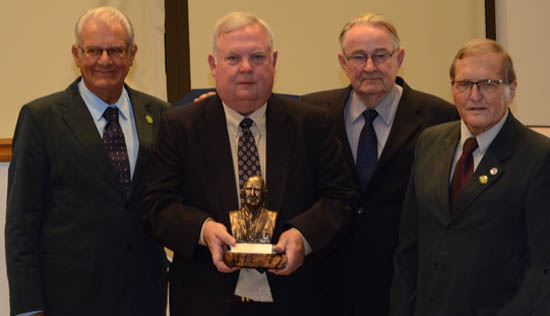Brazilian no-till leaders present UK with bust of Shirley Phillips
Brazilian no-till leaders present UK with bust of Shirley Phillips

The late University of Kentucky agronomist Shirley Phillips is known worldwide as one of the fathers of no-till agriculture. To honor him for his impact on Brazilian agriculture, a delegation from the Brazilian Federation of No-Tillage presented the UK College of Agriculture with a bronze bust of Phillips.
"No-tillage agriculture, pioneered by Dr. Shirley Phillips, greatly advanced soil conservation and reversed long-term soil degradation from the loss of soil organic matter,” said Brazilian farmer Franke Dijkstra. “In the last 30 years, this system has resulted in a 200 percent increase in Brazil's agricultural productivity. This is why, with the advent of the 50th anniversary of no-tillage in Brazil, the Brazilian Federation of No-Tillage honors Dr. Phillip's contribution not only to Brazil's agriculture but to the world’s.”
Herbert Bartz and Manoel H. Pereira joined Dijkstra at UK to present the bust. All are grain farmers from the state of Paraná and leaders of the no-tillage movement there. Located in southern Brazil, the state has excellent farmland and soils. However, the sloping terrain and frequent heavy downpours in the area caused significant soil erosion in the 1950s-1970s. Facing a potential agricultural, environmental and economic disaster, Bartz came to UK to visit Phillips. In addition to showing him UK’s no-till research efforts, Phillips took him to Christian County to see the late Harry Young, Jr.’s farming operation. Young planted the world’s first commercial no-till crop in 1962. Bartz began no-tilling soybeans in 1972.
After their initial meeting, Phillips remained incontact with the farmers, even after his retirement from UK, traveling several times to Brazil to advise them and give presentations on no-till advancements.
“He saved the industry in Brazil because of the practices he developed, researched and taught,” said Wayne Reeves, former research leader with the U.S Department of Agriculture- Agriculture Research Service at the University of Georgia. Throughout his career, Reeves worked with the same farmers on no-tillage issues. When the farmers decided they wanted to present UK with a bust of Phillips, they asked Reeves to serve as the link between the university and themselves.
Today, Paraná contains just 2 percent of the agricultural land in Brazil but is responsible for 23 percent of the country’s grain production. Approximately 95 percent of that state’s land is no-tilled.
“Agriculture still accounts for 25 percent of Brazil’s economy, and their ready adoption of no-tillage has made them some of the most advanced agricultural producers in the world,” Reeves said.
Professors in the UK College of Agriculture continue to share their expertise and knowledge with Brazilian and other South American farmers. UK Professor Emeritus William Witt traveled to Paraná to work with these farmers on weed control in the mid-1970s.
“It was my introduction to international cooperative efforts,” Witt said. “At that time, the United States was really limited in the herbicides farmers could use to control weeds in corn and soybeans, but South American countries were even more limited. When I visited, the Brazilian farmers had established efforts in using cover crops for weed suppression and understood the importance of cover crops in helping with weed control, and that really piqued my interest.”
John Grove, a UK soil scientist, has advised growers in Argentina and Brazil on improving the management of plant nutrition in grain crops, alfalfa and sugar cane. While the farmers gain knowledge from the college’s scientists, Grove said the exchange of knowledge is mutual.
“My work in South America has benefited my research and teaching programs here in Kentucky,” he said. “With the research, I have come to understand the chemical behavior of Kentucky soils and their capacity to deliver nutrients to the growing crop, within the larger context of these other productive agricultural soils. In teaching, my experiences in South America give me many examples to use with my students to show them how other growers deal with nutrient management challenges and how they do that in a very different cultural, political and economic context.”
The Phillips bust is 10 inches tall with a 6- by-7.5-inch base and is mounted on a slab of wood from a native Brazilian pine species that is a symbol of Paraná. It is inscribed in Portuguese with a quote from Phillips that translates to, “The limitations of no-tillage are only in man’s imagination.”
The Brazilian group plans to present a replica of the bust each year to honor others who have made contributions to no-till agriculture in Brazil.
Awards Community & Leadership Development Agricultural Economics Events Extension Research

